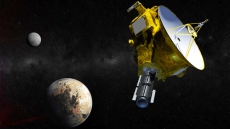You have one more reason to book your date with the much-awaited Matt Damon-starrer science-fiction film "The Martian" this weekend. The data obtained from NASA's Mars Reconnaissance Orbiter (MRO) has revealed first ever definitive signs of liquid water flowing on the surface of the Red Planet.
A strong evidence for seasonal flows of liquid salty water has been detected, scientists reported on Monday -- a hint towards a full-fledged life that may have been sustained on Mars in the past.
In a paper published in the journal Nature Geoscience, the team looked at streaks that form on some slopes on Mars during warmer times of the year, having previously suspected they might be caused by flowing, salty water.
According to Alfred S. McEwen, professor of planetary geology at University of Arizona, the team has identified waterlogged molecules - salts of a type known as perchlorates - in readings from orbit.
"That's a direct detection of water in the form of hydration of salts. There pretty much has to have been liquid water recently present to produce the hydrated salt," Dr McEwen noted.
NASA also provided details of this major science during a news briefing at the James Webb Auditorium at NASA headquarters here.
Nepali-origin researcher Lujendra Ojha, currently pursuing PhD at the Georgia Institute of Technology in Atlanta, is the lead author of the paper.
Ojha originally discovered signs of water on the Martian surface when he was studying at the University of Arizona, Tucson, in 2011.
"We find evidence for hydrated salts at all four locations in the seasons when recurring slope lineae are most extensive, which suggests that the source of hydration is recurring slope lineae activity," he wrote in the new paper.
"Our findings strongly support the hypothesis that recurring slope lineae form as a result of contemporary water activity on Mars," Ojha pointed out.
For the study, scientists developed a new technique to analyse chemical maps of the Martian surface.
They found striking fingerprints of salts that form only in the presence of water.
Adding to the growing literature on possible life conditions on the Red Planet, NASA's Mars rover Curiosity found in April this year that it is possible that there is liquid water close to the surface of Mars.
The explanation was that the substance calcium perchlorate has been found in the soil which lowers the freezing point so the water does not freeze into ice, but is liquid and present in very salty salt water - brine.
Nearly 4.5 billion years ago, Mars had six and a half times as much water as it does now and a thicker atmosphere.
But most of this water has disappeared into space and the reason is that Mars no longer has global magnetic fields, which we have on the Earth.
There have been other efforts from scientists to solve the mystery of water on Mars.
In 2013, geologists led by Dr Lydia Hallis from University of Hawaii examined a meteorite that formed on Mars more than one billion years ago to determine if conditions were ever right on the planet to sustain life.
The meteorite, called Miller Range 03346 nakhlite (MIL 03346), was recovered in 2003 in the Miller Range of Antarctica.
About the size of a tennis ball and weighing in at one-and-a-half pounds, MIL 03346 was one of hundreds recovered from that area.
"These meteorites contain water-related mineral and chemical signatures that can signify habitable conditions," the authors noted.
NASA's Curiosity Mars rover has also made the first detection of nitrogen on the surface of Mars from release during heating of Martian sediments.
The nitrogen was detected in the form of nitric oxide, and could be released from the breakdown of nitrates during heating.
Nitrates are a class of molecules that contain nitrogen in a form that can be used by living organisms.
The discovery adds to the evidence that ancient Mars was habitable for life.





